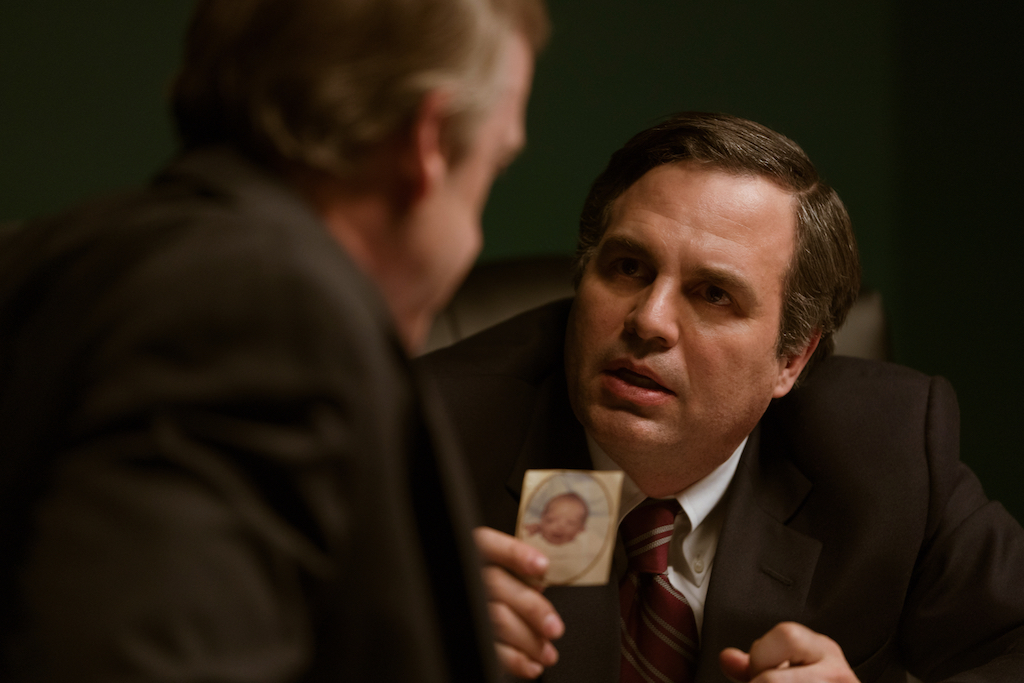
There’s a famous scene in the film Erin Brockovich—which, like, Dark Waters is about a greedy corporation knowingly poisoning drinking water in a rural community—where our smart and sassy working class heroine played by Julia Roberts is confronting a room full of suits. “By the way,” she says pointedly. “We had that water brought in special you folks.”
It’s a show stopper of a moment, as the lawyers get a little green around the gills and put down their glasses.
You won’t see any moments like that in Dark Waters.
The film isn’t boring, per se, but it is serious-minded, almost to a fault. It stubbornly eschews crowd pleasing theatrics. It doesn’t pander. It leaves big moments (the receipt of a fat settlement check; a death in the family) off camera. It’s the rare American film that trusts in both the intelligence and patience of its audience.
In some ways, the film’s sober tone matches the personality of its protagonist. Mark Ruffalo, who also executive produced, plays the real life corporate lawyer Robert Bilott. One day, a farmer named Wilbur Tennant (remarkable Bill Camp, who deserves Oscar consideration) shows up at his offices in Cincinnati. He explains that DuPont is poisoning his livestock and he has videos to prove it. Bilott is baffled. “I’m a corporate defense attorney,” he explains. “I defend chemical companies.” “Well, now you can defend me,” Wilbur says stubbornly.
Turns out, Wilbur is an acquaintance of Bilott’s grandmother—who also lives in West Virginia, where Bilott himself was raised—so out of a sense of duty, he follows up (he’s also able to throw in a visit to grandma while he’s at it). He’s shocked by what he sees: sick cows staggering around with open wounds and a big field essentially serving as a cow graveyard. Naively, he believes that if he tells DuPont executive Phil Donnelly (a wonderfully unctuous Victor Garber), the matter will be cleared up. Donnelly feigns concern but does nothing. Bilott continues to look into the matter and the more he learns, the more horrified he becomes. It seems DuPont is not just poisoning cattle, but the community of Parkersburg’s drinking water as well, all to make their wildly popular Teflon products.
Of course, trying to take on a corporation as massive as DuPont requires money, time—more than a decade as the film underscores—and support. And Bilott gets that support from an unlikely source: his own law firm. Yes, there are many at the firm who want Bilott to drop the case (it’s particularly irritating to the partners because they were hoping to go after DuPont . . . as a client), but Bilott’s boss (Tim Robbins) mostly has his back. Corporate lawyers may get a bad rap, he explains, but even they draw the line at poisoning small town America.
There’s another source of resistance—and a surprising one at that: the residents of Parkersburg themselves. Many of them work for DuPont. Causing DuPont to pay off massive law suits, or possibly even shut down their chemical plant, could cause them their livelihoods. Here, the film shows how corporate America has us all in its grips.
And yet Bilott doggedly does the right thing—digging through the hundreds of boxes of data that DuPont dumped on him in discovery, interviewing scientists, and visiting community members. It takes a toll on his life. He becomes obsessed. His patient wife, played by Anne Hathaway, gets frustrated. Hathaway is given a fairly substantial part, as such things go, but make no mistake, it’s still the supportive wife role. (One of the many reasons I adore Erin Brockovich is because the supportive “wife” is played by Aaron Eckhart.)
Ruffalo plays Bilett as a mild-mannered man, not prone to histrionics. Don’t expect a lot of grandstanding in this film. He’s a put your head down, purse your lips, and get the job done sort of guy. Ruffalo is good in the role, but in keeping with the rest of the film, he dials down his charisma a lot. (If you’re looking for charisma, Bill Pullman provides it in abundance, but his role as a courtly but savvy trial lawyer is woefully small.)
Dark Waters is directed by Todd Haynes, a director I love to the point of hero-worship. But this is not an auteurist film by his usual standards. It’s an exceptionally made procedural with an urgent, earnest anti-corporate message. Everyone who made the film cares deeply—and it shows. I almost feel guilty for preferring Erin Brockovich. Sometimes I just like a little more movie in my movie.
